Sci-Fi Movie 'The Black Hole'
Maximilian Schell went against type casting and played a mad scientists in the sci-fi movie 'The Black Hole.'
Ηe's portrayed Nazi butchers by the dozens, gangsters and conmen... With the sci-fi movie The Black Hole, actor Maximilian Schell added a mad scientist to his cinematic rogues gallery.
But Hollywood loves to cast against type. When the cameras stopped, the Viennese-born performer reverted to his true identity: a quiet, intellectual sort who enjoys fine paintings, and the star-struck type who collects autographs.
Not surprisingly, Schell regarded himself as a versatile player willing to experiment with different types of roles and films. He explained that this desire is what had led him to accept the part of evil scientist Dr. Hans Reinhardt in the Disney release of The Black Hole.
"When I saw the script for The Black Hole I thought it was a decent script, full of special effects. But I felt that in all the science-fiction films I've seen, the human beings were always falling short; for the most part, they had been two-dimensional. For example, when I think of Star Wars, the only one who really had any three-dimensional human touches was R2-D2: he was a genuine human character and I loved him for it. The others were just like furniture."
"That was the danger of this type of film. Just as in Stanley Kubrick's 2001: A Space Odyssey I found everything surrounding the people to be much stronger than the people themselves. The film is one of the great masterpieces of all time, but if Kubrick could have managed to get us interested in the astronaut's soul and not just his development into the embryo phenomenon, it might have provided deeper emotions to identify with.”
According to Schell, The Black Hole director Gary Nelson left his preproduction work at the studio and traveled to the actor's home in Austria. During this visit the filmmakers examined their approach to the project and Nelson impressed upon Schell the desire to make something “truly human” out of all the characters. It had been this mutual agreement that persuaded him to sign on.
“One of the big errors audiences have is in thinking that an actor can choose his scripts,” Schell explained. “Maybe five actors in the world have the luxury to choose from 20 scripts and pick the one that they like best. Ninety-nine percent of us were happy when anything is submitted.”
At the start of shooting for the sci-fi movie The Black Hole neared, the actor began reading upon the title subject to better prepare for the role. After struggling through several books, Schell found his efforts less than satisfying.
“I didn’t learn a thing,” he admitted flatly. "But since I play a scientist who is supposed to understand everything about black holes, I did manage to pick up some of the formulae because they were in the actual script."
“Since the nearest black hole is supposed to be something like 6,000 light-years away, no one is really going to be able to prove if what Disney presented is right or wrong. So it’s basically a fantasy film.”
Entering a Foreign Environment
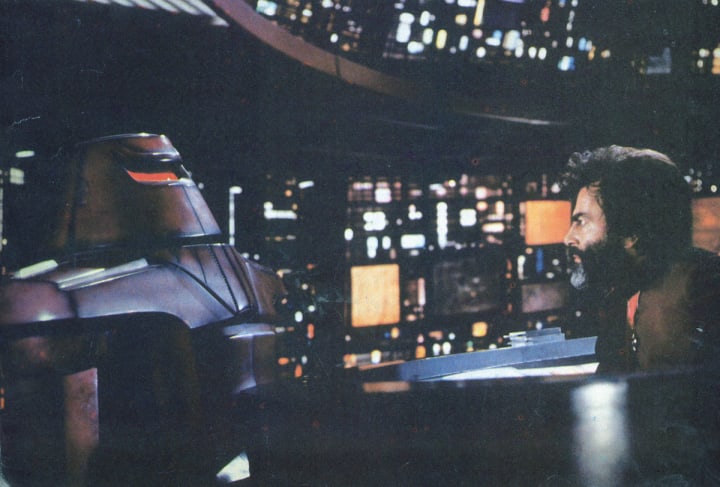
Maximilian Schell was regarded as a truly international actor, but his involvement with the sci-fi movie The Black Hole marked his very first science fiction opus—and his first Disney film. Did he have any qualms about entering this foreign environment?
"Well, when I heard the word 'Disney,' my face light up with joy—like practically everyone’s face does. In my youth I knew of Snow White and Dopey. Actually Dopey is one of the reasons why I agreed to do this picture; I wanted to be near where he came from. When I agreed to do the film, Ron Miller, head of Disney Studios, sent me a telegram that said, 'Welcome to the Family!' I had never received anything like that from a movie company in my life."
"At last I went to the studio in Burbank and as I walked around the lot there was a Dopey Avenue and a Snow White Avenue; It was something to see all of these lovely things that reminded me of my childhood. Working for Disney was a wonderful experience, going through the studio and seeing what Walt had created; It was worth the trip to California alone."
“And besides,” he laughed, “We also made the picture.”
However, there was one act of kindness from the studio that Schell did not forget.
“I had just finished directing a picture called Tales from the Vienna Woods and they [Disney] gave me use of a cutting room that was situated next door to my dressing room. At times there were long, long hours to wait for the next set-up, since we had so many complicated scenes. Instead of just sitting and waiting, which is the worst part of film acting, I could be editing my movie.”
Star Achievements
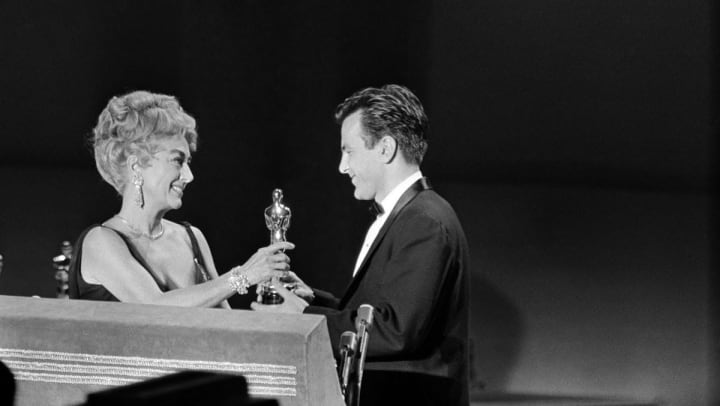
Image via The Hollywood Reporter
Film directing was one of Maximilian Schell’s many achievements at the time. In addition to Vienna Woods, the versatile performer helmed several other foreign features including First Love and The Pedestrian, which were both nominated for Academy Awards. Schell himself had been in Oscar contention several times and copped the 1961 Best Actor honors for his performance in Judgment at Nuremberg.
When asked if he would have preferred for The Pedestrian to win an Oscar for Best Foreign Picture than to have received the Best Actor trophy, Schell hedged, "I would like to have won both!"
"I think the Academy Awards were wonderful; but when you win as an actor it puts more of a 'stamp' on the achievement than if you win as a director. Winning for The Pedestrian would have helped the picture, because it was not a commercial success."
“While many of the pictures I did were ‘commercial’ films, sometimes it's not always a question of dollars and cents; Many times I did a movie out of love for the project.”
While another actor might have been tempted to take the colorful character of Hans Reinhardt and camp it up, Schell assayed the part with his usual air of professionalism.
"You always approach a character somewhat in the same way. You read the script, see what sort of a figure he is, and try to dig a bit into his background. The background in Reinhardt’s case was kind of easy to determine: He's sort of a Werner von Braun-type who had been sent by the United States to discover life in outer space."
"When he got caught by the black hole he didn't want to leave with the rescue ship because he hoped to find ultimate knowledge there; In his opinion, there was no place else in the universe where he could have learn such cosmic secrets."
“When people come from Earth to find him, then my work with the character began. I had always found that great men of science and men of great achievement have great human weaknesses; They are stingy or they are homesick. I played Reinhardt as very homesick; After 20 years away from Earth he's asking, 'Does Central Park still exist?' 'Is Christmas still celebrated the same way?' ”
“The combination of these human elements which we could have had and the concept of the role, in which he's a larger-than life personality, might make him human—and hopefully funny. I think every great man should have that little touch of humor.”
Problems and Solutions
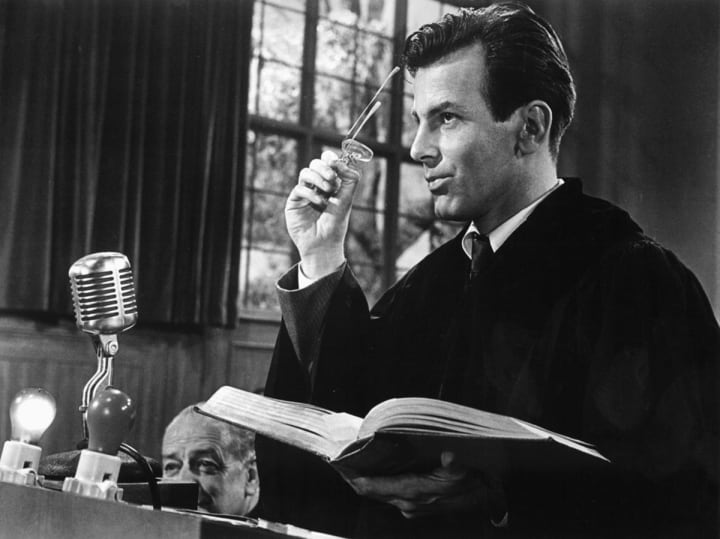
Image via NY TImes
Although the $20 million production was planned down to the most minute detail, problems still occasionally cropped up. Sometimes a well-polished scene in the script would not play 'right' when the actors delivered their lines; Often a minor touch could have provided a clever solution.
"It was the task of the performer and the director to meet these kinds of challenges,” Schell said. “We had these plot lines [of dialogue] which were sometimes necessary in a film to move the story forward; Often it’s hard to deliver these dramatically in a convincing way."
"There was a line: 'These people from Earth must be destroyed!' We had found a solution by using the robot, coincidentally called Maximilian, coming to me and I read from his blinking eyes: 'These...people... from... Earth... must... be... destroyed!' It was much more interesting than him just walking up and saying the line."
“One of the most difficult things that I had found in acting was to deliver plot lines—lines you would never say in real life. We said things like, ‘Good morning... How are you?' We never say, 'You, who have come here at 9:30 this morning, are interviewing a little actor from Switzerland.' But you can try to add human touches and halfway believable circumstances.”
The actor most emphatically disagreed with critics who charged that performers generally played second fiddle in special-effects-filled movies. Schell believed that camera trickery did not necessarily have to be an actor’s enemy nor his crutch.
"I loved acting with special effects because it was so much more exciting. Certain types of effects could actually be a help to the performer if he took the right attitude toward them."
"Nothing was more difficult than when the director placed you in a crowd of people—who must remain quiet for the soundtrack—and then you had to shout something like, ‘Come over here.’ You felt silly for shouting in that kind of silence. You had to keep in mind the looping that came later when they had mixed the sound of a crowd and your voice. Afterwards, it worked perfectly, but at the time it was very distracting."
“All these ‘phony tricks’ made a scene very difficult because you had to keep all these details in your head and worry about saying the line properly. But blue-screen work, for instance, was different; You knew that later there was going to be a background put in.”
Both as an actor and a professional filmmaker, Schell was constantly amazed by the various special-effects techniques employed for the sci-fi movie The Black Hole. He was especially impressed by the various working robots he shared many scenes with.
"Actually, these robots—these computers—could become much more human appearing than the actors; It’s just fantastic. The things they did with little Vincent and Bob; Little Bob was nice—he was so beaten up."
“Disney always has done such a fine job with robots and mechanics, just like some of their exhibits in Disneyland. They were planning to have a Black Hole exhibit in Disneyland, but it never came around; I still never thought I’d be fortunate enough to become a part of that place.”
From Child Prodigy To Nazi Fanatic
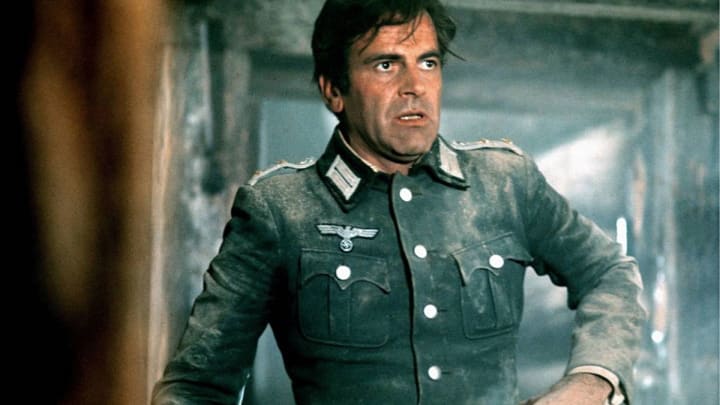
Image via El Confidencial
The performer considered his career to be pretty successful—especially when he recalled his first role at age four as a blade of grass in a play about flowers. Somewhat of a child prodigy, Schell traveled through the world of fine arts appearing on stage, writing music and taking a turn as a Swiss drama critic.
After several German films and many stage performances throughout Europe, he tried his luck with American filmmaking and debuted in the 1957 film The Young Lions with Marlon Brando. Some of his better known roles were in Topkapi, Cross of Iron, and The Odessa File.
While Schell had received worldwide acclaim for his portrayal of complex characters in Julia (for which he was nominated for a Best Supporting Actor Oscar) and The Man in the Glass Booth (for which he was nominated for Best Actor honors), he always bemoans the fact that so many Nazi fanatic parts came his way.
“I’m always the first one in the producer’s mind,” he complained. “I really can’t say that I know why, because these types of people were so opposite from me. I’ve done them [Nazis] so many times that the challenge is gone; How many times can you play the same role and keep it fresh and exciting?”
Such comments were typical of Schell and almost led a person to believe that the actor worked more for enjoyment than any other reason. This attitude was further emphasized as he had discussed his work on the sci-fi movie The Black Hole.
"Sure, I suppose it was kind of a hammy part," he remarked,"“but there’s certainly nothing wrong with that. As an actor, I really enjoy a role like this from time to time, when you can do some scenery-chewing and let yourself go a bit."
“What was interesting was to watch the other actors while you’re playing one of the melodramatic scenes. They got that twinkle in their eyes and start to smile as if they want to say, 'Oh, brother!' It’s all right to enjoy yourself and have a little fun, as long as you didn’t burlesque the situations.”
In fact, Schell said that “everyone really attacked the [Black Hole] project and all the actors worked like dogs to get it right.”
Schell admitted that it was too early to tell whether Disney would have considered a sequel to the sci-fi movie The Black Hole, but he made it clear that he would have loved to have made another film for the studio if they had come up with another good script. Unfortunately for Schell, who has passed away at the age of eighty-three, he did not get the chance to be part of a sequel or remake.
About the Creator
Futurism Staff
A team of space cadets making the most out of their time trapped on Earth. Help.

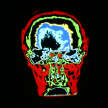
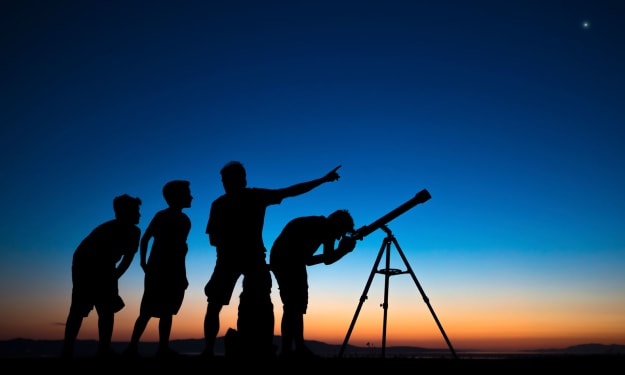



Comments
There are no comments for this story
Be the first to respond and start the conversation.